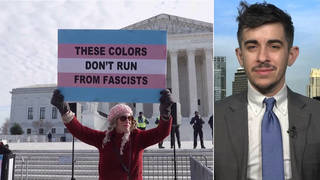
Related
On his first day back in the White House, Donald Trump moved to roll back protections for transgender people. In his inaugural address, Trump declared the U.S. government’s policy is “there are only two genders: male and female.” Chase Strangio, co-director of the American Civil Liberties Union’s LGBTQ & HIV Project, describes Trump’s executive orders aimed at pushing “a slew of policies that just seek to both eradicate trans people from civic and public life and also push trans people out of federal government.” “Trans people are bracing themselves for a lot of negative outcomes here, not just symbolic, but really material ones,” says Strangio. “I know the community is scared. I know people are confused. And in this chaos, we just have to come together and build all the forms of resistance we know how to.”
Transcript
AMY GOODMAN: This is Democracy Now!, democracynow.org. I’m Amy Goodman, with Juan González.
On his first day back in the White House, President Trump also moved to roll back protections for transgender people. He outlined part of his plan during his inaugural address.
PRESIDENT DONALD TRUMP: It will henceforth be the official policy of the United States government that there are only two genders: male and female.
AMY GOODMAN: To talk more about Trump’s executive actions, we’re joined by Chase Strangio, co-director of the American Civil Liberties Union’s LGBTQ & HIV Project, recently became the first openly transgender lawyer to argue a case before the U.S. Supreme Court.
Chase, it’s great to have you with us on this day. Explain what Trump is doing.
CHASE STRANGIO: Yeah, so, obviously, you can hear from the rhetoric — that was one of the centerpieces of his campaign — that he is targeting trans people by focusing on retrenching this notion of a fixed gender binary at the time of conception. So, that came out in his inaugural address, and then, last night, he signed an executive order, quote-unquote, “defending women” and “restoring biological truth to the federal government.” Now, the audacity of having this administration come in, claim to defend women, while defining women as “the adult human female,” which means the sex that produces the large cell at the time of conception, while simultaneously attacking abortion, contraception, and, you can see in this language, beginnings of fetal personhood. Now, this is one of the central problems that we’re going to see in this administration, is the claim to be defending women by targeting trans people through a slew of policies that just seek to both eradicate trans people from civic and public life and also push trans people out of federal government in a myriad ways.
JUAN GONZÁLEZ: And one executive order also includes a directive that forces the secretary of housing and urban development to submit a policy for, quote, “protecting women seeking single-sex rape shelters.” Can you talk about this potentially putting trans people at risk?
CHASE STRANGIO: Yeah, so, there are many, many instructions in this one executive order, including this directive to HUD to issue proposed regulations to, in essence, exclude trans people from various forms of shelter system, under the auspices that a trans person is an inherent threat to nontransgender women. Obviously, that just enhances the risk that transgender people face in society, if we are deemed as a threat to others simply by existing. And the order also includes directions to, for example, the secretary of state and Department of Homeland Security to possibly revoke the passports of transgender people because those passports do not reflect this, quote-unquote, “biological reality” that sex is only binary at the time of conception.
AMY GOODMAN: Let me ask you about the executive order also requiring all government-issued identification documents, including passports, visas and Global Entry cards, to be biological classification as either male or female. The significance of this, Chase?
CHASE STRANGIO: I mean, it’s hugely significant. Already last night, we saw from the Department of State’s website that a possibility to update your gender marker on passports has already come down. We know that people rely on accurate identification to move freely through the country and around the world. This will put trans people at risk of violence. It means every time you have an encounter with the government, the likelihood that you will be outed is significantly increased. And then, with that outing comes the risk of discrimination, harassment and potentially violence. So trans people are bracing themselves for a lot of negative outcomes here, not just symbolic, but really material ones.
AMY GOODMAN: Your final thoughts?
JUAN GONZÁLEZ: And, Chase, talk about the significance of the 2020 Supreme Court case Bostock v. Clayton County and how it could potentially lead to more workplace discrimination.
CHASE STRANGIO: Yeah, so, Bostock, in essence, ruled — the Supreme Court said federal laws prohibiting sex discrimination cover LGBTQ people. Last night, the Trump administration rescinded President Biden’s executive order implementing that decision. So this is just another way in which we can expect this administration not to protect trans people, but to target us. I know the community is scared. I know people are confused. And in this chaos, we just have to come together and build all of the forms of resistance that we know how to. But it is scary and it is alarming to read those executive orders last night.
AMY GOODMAN: Well, Chase Strangio, we’re going to be talking to you a lot in these years. Chase Strangio, co-director of the American Civil Liberties Union’s LGBTQ & HIV Project.













Media Options